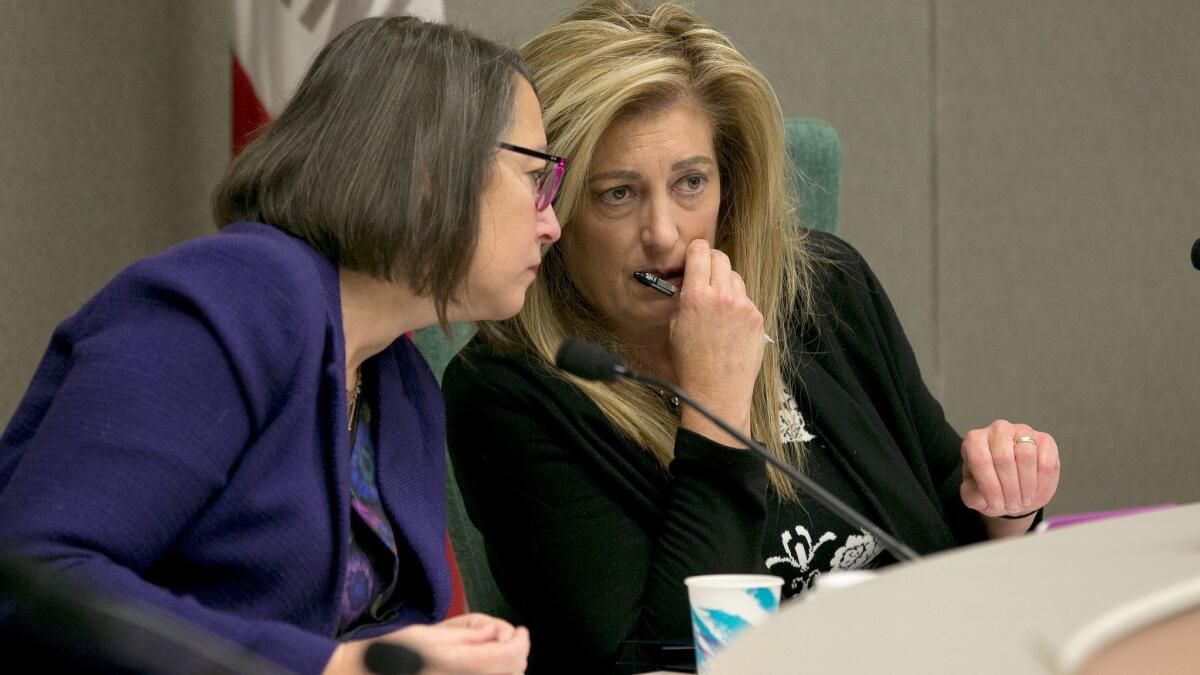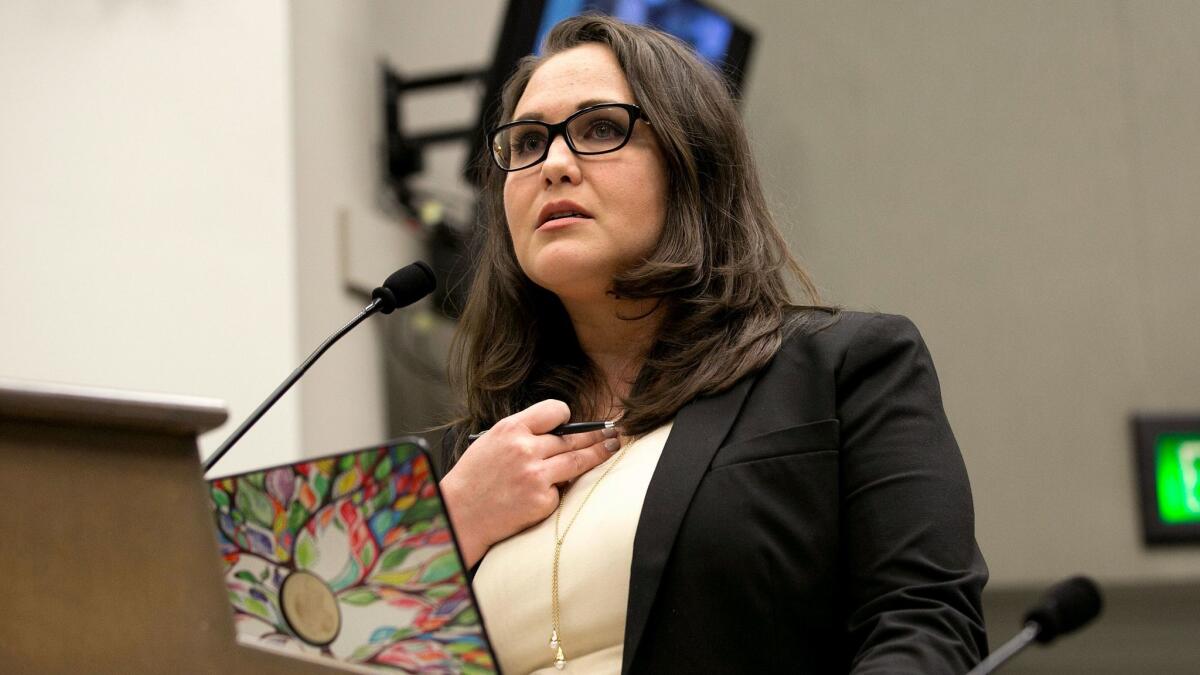Victims denounce a failing system for reporting sexual harassment at the California Capitol

- Share via
Reporting from Sacramento — California Capitol lobbyists, staffers and lawyers on Tuesday urged lawmakers to overhaul how the state Assembly tracks and handles sexual harassment claims, saying current procedures are confusing, vaguely enforced and result in greater consequences for victims rather than their abusers.
Their calls for action came during a nearly five-hour committee hearing – the first of either legislative house — to review chamber policies and existing training against sexual misconduct. Leaders of the committee called the meeting a first step to combat a culture of sexism and fear that has created a hostile workplace environment for many women in politics.
“We know we are scratching the surface of what is clearly a problem across our country and across many industries and organizations,” said Assemblywoman Laura Friedman (D-Glendale). “But unlike a lot of those bodies we are committed to doing something transparently and expediently. Everyone who comes in contact with the Legislature — and that is employees, interns, lobbyists, activists and even other members — should be protected from abuse.”
The public hearing followed the immediate resignation a day earlier of Assemblyman Raul Bocanegra (D-Pacoima), the first lawmaker to step down amid recent sexual assault allegations. Another legislator, Sen. Tony Mendoza (D-Artesia), on Wednesday was stripped of key leadership posts by his colleagues.
The national focus on sexual harassment was sparked by high-profile allegations against Hollywood producer Harvey Weinstein and the #MeToo social media movement. At the Capitol, it was propelled with an open letter from more than 140 women denouncing a “pervasive” culture of misbehavior in state government.
In powerful testimony during Tuesday’s hearing, witnesses said there is a disconnect between policies that sound good on paper but are not put into practice.
Activists shared cases of young employees losing jobs, relationships and their passion for politics after reporting misconduct.
Lobbyist Pamela Lopez, who has told media outlets that a lawmaker masturbated in front of her in a bar bathroom, said she now feels she has the job security and connections to share her painful personal story. She said she had been too fearful to talk about other incidents that happened to her when she was as young as 23.
She still has not disclosed the name of her abuser for fear of retaliation, she said, and she is not alone. Since making her experience public, she has received an outpouring of support from victims, many of whom have similar stories but have felt too powerless to come forward.
“The easiest way to get rid of evidence is to get rid of that young woman,” she said. “Women have an instinctive desire to hide what has happened to us. It’s because we recognize that if anyone finds out something has happened to us, our own careers may be in danger.”
Jennifer Kwart, the district director for Assemblyman David Chiu (D-San Francisco), detailed the factors that make district interns vulnerable targets, and told her own story. Those offices away from Sacramento are isolated, programs aren’t regulated and interns don’t go through sexual harassment training, she said.
Kwart has said she was 19 when Mendoza invited her to his hotel and offered her alcohol during the 2008 Democratic state convention in San Jose. “What happened to me happened hundreds of miles from the Capitol,” she said.
Have you experienced sexual harassment in government or politics? Share your story »

Christine Pelosi, chair of the California Democratic Party Women’s Caucus, said problematic staffers and lawmakers should face punishment and expulsion, unlike Catholic priests who were simply transferred to a different church if they were found to have molested children. For now, she said, victims rely on a “whisper network” to avoid danger.
“What everyone here knows is that we have rapists in this building,” she said. “There are perpetrators, enforcers and enablers in this building.”
Testimony also revealed an obscure process for how the state Assembly tracks and investigates sexual harassment claims. In a long line of probing, Debra Gravert, the chamber’s chief administrative officer, said the legislative body tallies only investigations — not complaints.
She also acknowledged the Assembly Rules Committee had received complaints against Assembly members over the last two weeks. She said she could not immediately provide how many claims had risen to the level of an investigation over the last decade.
Several subcommittee members suggested the failure to keep clear and full tallies of claims was a problem, as it skewed the snapshot of the issue and could expose the Legislature to legal action.
“If we’re not keeping track of complaints we are all now liable, potentially,” said Assemblywoman Eloise Gomez Reyes (D-Grand Terrace).
Others pointed to the lack of clarity in how the Assembly determines whether a claim is considered a violation or should be directed to an external investigator.
The state Assembly’s policies against sexual harassment have been revised six times since the chamber first adopted them in February 1993. Friedman’s subcommittee, which is tasked with revising them, was initially created in 1996. The current panel of members was appointed in June.
Under the policies, employees can report sexual misconduct to their supervisor, the Assembly member they work for or to officers and members of the Rules Committee. Officers for that committee said they typically conduct an internal investigation, contact the individual accused and refer any claims that rise to the level of violations to an outside investigator.
That is a different process from the Senate, which recently imposed a change in the process and will now refer all sexual harassment investigations to outside lawyers.
Witnesses said the Assembly could take immediate steps to improve its procedures, such as offering crisis counseling and creating a confidential hotline so that anyone in the Capitol community could file a report at any time.
In the long run, staffers, lobbyists and activists say, both the state Assembly and Senate need a bicameral process in which neither legislative house is involved in a sexual misconduct investigation at any point in the process.
As the testimony wore on, Friedman said the more she heard the stories from victims who dealt with the system, the more she believed the Legislature “could not police itself.”
“This has to end,” Friedman said. “It’s my commitment to you that we’re going to do our best to end that culture.”
ALSO
Sexual harassment hearings come as California Capitol is roiled by accusations and a resignation
State Sen. Tony Mendoza booted from leadership posts pending sexual harassment investigation
California Assembly speaker calls harassment allegations against Bocanegra ‘extremely disturbing’
Coverage of California politics
UPDATES:
9:37 a.m. This story was updated to correct the length of the hearing. It was nearly five hours long.
This article was originally published at 9:15 p.m.
More to Read
Get the L.A. Times Politics newsletter
Deeply reported insights into legislation, politics and policy from Sacramento, Washington and beyond. In your inbox twice per week.
You may occasionally receive promotional content from the Los Angeles Times.











